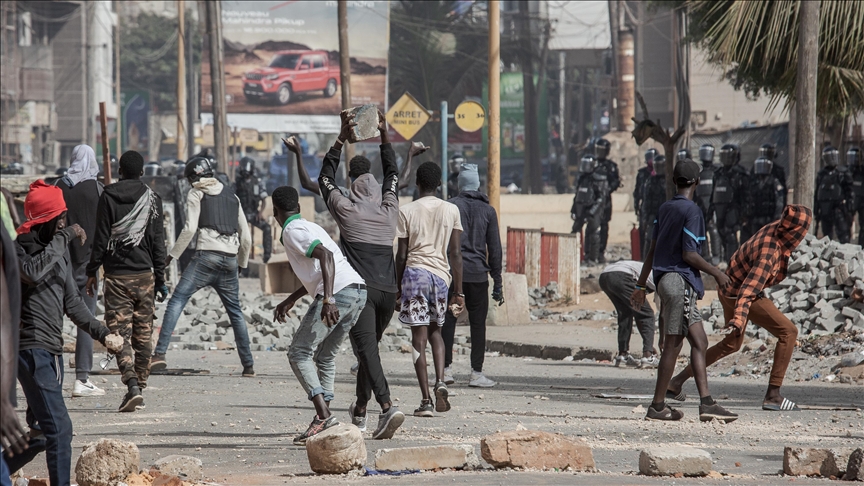Political strife in Senegal: What lies ahead?
Next year’s presidential election remains a key issue in deadly protests sparked by opposition leader Ousmane Sonko’s jail sentence

KIGALI, Rwanda
More than a dozen people have been killed in deadly violence that broke out in Senegal last week after opposition leader Ousmane Sonko was sentenced to jail.
Over 350 people have been injured, while the death toll currently stands at 16, according to latest figures.
Most of the casualties were in the capital Dakar and Zinguinchor, Sonko’s hometown, as his supporters clashed with security forces.
Sonko, president of the PASTEF-Patriots party, was charged with rape and making death threats against Adji Sarr, an employee of a beauty salon, in Dakar in 2021.
Last week, a court acquitted Sonko of the rape charges, but sentenced him in absentia to two years for “corrupting youth,” disqualifying him from running for president.
The escalation has gone beyond Senegal’s borders.
Several Senegalese consulates abroad, including in Bordeaux, Milan, Paris and New York, were closed following attacks that the Foreign Ministry said “caused serious damage.”
Hundreds of people have been arrested for the violence, which both sides have tried to pin on each other.
The government accuses the opposition of “destabilizing the country,” with Interior Minister Antoine Diome going as far as to allege the involvement of foreign influence.
What is happening now?
Since last year, Sonko, 48, has been mayor of Ziguinchor, a major city in southern Senegal.
Sonko has declared he wants another shot at becoming president, having finished third in the 2019 election won by incumbent Macky Sall.
He has refused to accept the verdict, claiming the case was politically motivated to keep him out of next February’s presidential election.
Since last week’s verdict, he remains at his house in Dakar under tight security.
His lawyer, Cire Cledor Ly, has accused authorities of “acting in arbitrariness and manifest illegality,” saying they are not allowing his legal team to meet him.
Senegal’s Justice Minister Ismaila Madior Fall has said Sonko could be arrested at any time.
“In a state governed by the rule of law, all judicial decisions must be enforced. In this decision rendered in absentia, the convicted person does not have the right to an appeal,” he said on Monday.
Sonko was previously arrested in March 2021 ahead of a court appearance in the same case.
That arrest also sparked deadly protests, with at least 14 people killed and about 600 others injured in several cities, according to Red Cross figures.
The arrest came on the back of a month of tensions after the government lifted Sonko’s parliamentary immunity, while there were also reports of arbitrary arrests of several members of his party.
Sonko was provisionally released soon after, but remained under judicial supervision.
What is causing the outrage?
Youth unemployment has played a critical role in fueling the opposition protests.
Many unemployed youth feel Sall has abandoned them and have been willing to buy Sonko’s claims that his legal troubles are part of a government plot to block his presidential bid.
However, what is more critical is speculation that Sall will seek reelection for a third term.
While Senegal’s Constitution limits presidents to two five-year terms, Sall has indicated that a constitutional reform adopted in 2016 allows him to seek another term.
He is, though, yet to officially announce his candidacy.
Idrissa Seck, leader of the opposition Rewmi party, warned that Sall running for reelection could make things worse.
“There could be more violence. The situation could get worse if Sall announces a bid for a third term,” Seck told Anadolu.
“The urgent need now is to restore peace. Violence is not good for our people and country. It leads to innocent deaths and affects our political image,” said Seck, a former minister who quit Sall’s government to run for president next year.
What comes next?
The UN, African Union, and the Economic Community of West African States regional bloc have strongly condemned the violence, calling for all sides to exercise restraint and opt for dialogue.
Moussa Faki Mahamat, chairperson of the African Union Commission, said the violence only serves to “tarnish the image of Senegalese democracy, of which Africa has always been proud.”
While the West African country has witnessed turmoil before, the recent clashes are the worst political crisis to occur since the general strike and electoral protests of 1988, according to Amnesty International.
The League of Imams and Preachers of Senegal has urged Sall to steer the country back to peace and stability.
Sall, who is yet to address the nation on the crisis, visited Serigne Mountakha Mbacke, the current leader of the Mouride brotherhood, Senegal’s most influential religious order, on Monday night.
Mbacke had called on protesters in the city of Touba, the brotherhood’s headquarters, to stop demonstrations and return home.
During the March 2021 unrest, the cleric held meetings with both Sall and the Senegalese opposition, which proved instrumental in efforts to restore peace.
Sall’s outreach to him has raised hopes of some sort of dialogue to defuse tensions. However, fears of continued unrest still persist, particularly after Sonko issued a call for popular resistance.
Anadolu Agency website contains only a portion of the news stories offered to subscribers in the AA News Broadcasting System (HAS), and in summarized form. Please contact us for subscription options.




